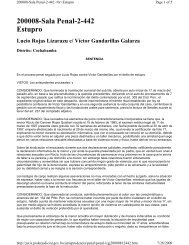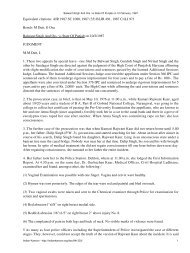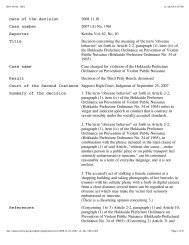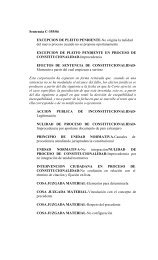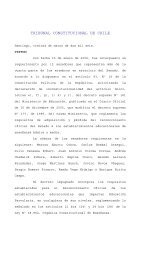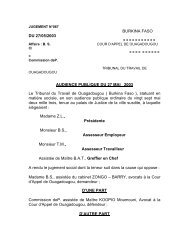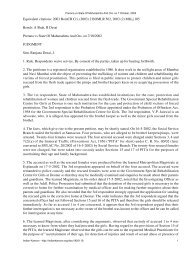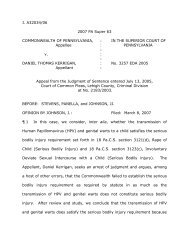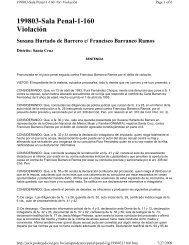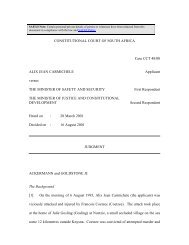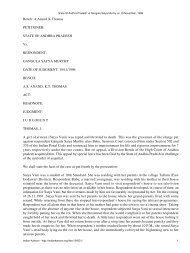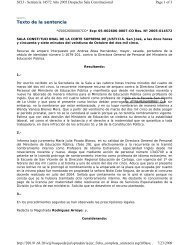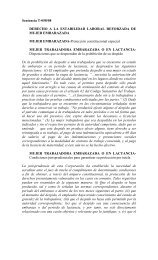P. Rathinam v. Union of India - Cornell University
P. Rathinam v. Union of India - Cornell University
P. Rathinam v. Union of India - Cornell University
- No tags were found...
Create successful ePaper yourself
Turn your PDF publications into a flip-book with our unique Google optimized e-Paper software.
Which, according to him, has to be influenced by experience and supported by reason.38. The next important thinker <strong>of</strong> England after Hooker was the famous Francis Bacon (1561-1626). In hisEssays (the most popular <strong>of</strong> his works) we find his views on legislators and legislation. Bacon stood out forprogress and utility and was <strong>of</strong> the view that it was not good to try experiments in legislation. As againstBacon there was Sir Edward Coke, who was a defender <strong>of</strong> the rights <strong>of</strong> the Parliament. Mention is then madeabout John Locke (1632-1704) according to whom the laws made must respect the right to liberty andproperty; and laws must be made for the good <strong>of</strong> the people.39. Ruthnaswamy then takes the reader to France and mentions about Montesquieu (1689-1755), who in hisfamous Spirit <strong>of</strong> Laws published in 1748, which has been regarded as a great classic <strong>of</strong> political and legalliterature, rendered immemorial service to legislation and legislatures. In this monumental work, he insiststhat laws and legislation should be in conformity with the spirit <strong>of</strong> the people, if its traditions, its philosophy<strong>of</strong> life, even the physical surroundings <strong>of</strong> the people, including the climate. The journey is then to Germany,where Leibnitz (1646-1717), a philosopher, mathematician and adviser <strong>of</strong> kings and princes in Germany andEurope, took the view that greatness <strong>of</strong> law is proved by the fact that great rulers were also great law- givers.Names <strong>of</strong> Augustus, Constantine and Justinian are mentioned in this regard. The German philosopher furthersaid that the law must serve morality, because what is against morals is bad law.40. Readers then find themselves in Italy and they are acquainted with Beccaria (1739-1794), who through hispamphlet under the title Delict and Crimes published in 1766 brought a revolution in the theory and practice<strong>of</strong> punishment, because, according to him, punishment <strong>of</strong> crime must be used only for the defence <strong>of</strong> the Stateand the people and not for retribution and revenge which principles were holding the field then.41. As per sequence <strong>of</strong> time, the next writer to be mentioned is Edmund Burke (1727-1797), who was aparliamentarian, statesman and political412P.<strong>Rathinam</strong> vs <strong>Union</strong> Of <strong>India</strong> on 26 April, 1994thinker. According to him the main essential <strong>of</strong> good laws and legislation is that the same should be fit andequitable, so that the legislature has a right to demand obedience. He would say there are two fundamentalprinciples <strong>of</strong> legislation equity and utility.42. Blackstone is a name which is immortal in the world <strong>of</strong> legal jurisprudence. It is his Commentaries on theLaws <strong>of</strong> England (1765) which has made him so. He emphasised on the inviolability <strong>of</strong> common law, freedom<strong>of</strong> persons and property. After Blackstone, came Bentham (17481832) and the Utilitarians.43. Ruthnaswamy has also acquainted the readers about the views <strong>of</strong> Plato, Aristotle, Cicero and ThomasAquinas, so also what Voltaire (16941773) had to say. We do not propose to burden this judgment with theirviews; but what was said by Macaulay (1800-1859) has to be noted, because it is he who had drafted ourPenal Code. Macaulay believed in the efficacy <strong>of</strong> law in improving people and their character. He wrote:"When a good system <strong>of</strong> law and police is established, when justice is administered cheaply and firmly, whenidle technicalities and unreasonable rules <strong>of</strong> evidence no longer obstruct the search for truth, a great change <strong>of</strong>the better may be expected which shall produce a great effect on the national character."44. In Chapter 6 <strong>of</strong> the book, Runthnaswamy has stated that after the principles <strong>of</strong> Benthamism andutilitarianism, reason, utility and individual liberty had exhausted themselves, humanitarianism occupied thefield and it is this principle which has seen the enactments <strong>of</strong> statutes like Workmen's Compensation Act,Factories Act and various other statutes dealing with public health, sanitation and weaker sections.<strong>India</strong>n Kanoon - http://indiankanoon.org/doc/542988/ 10



